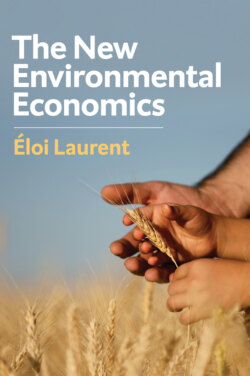The New Environmental Economics

Реклама. ООО «ЛитРес», ИНН: 7719571260.
Оглавление
Eloi Laurent. The New Environmental Economics
Contents
Guide
Pages
Dedication
The New Environmental Economics. Sustainability and Justice
Copyright page
Figures. Graphs
Boxes
Figures
Tables
Introduction: Economics for the twenty-first century
Notes
1 What the classics know about our world; what twentieth-century economics forgot
The physiocrats: Natural resources as political power
Malthus and sustainability analysis
David Ricardo and planetary boundaries
John Stuart Mill and the steady state
What twentieth-century economics forgot
Notes
2 Humans within the biosphere: The paradox of domination and dependence
Box 2.1 The population (on-going) problem
Human evolution toward planetary dominance: The small household and the bigger one
The biosphere: Interdependence and collaboration
Thermodynamics and material flow analysis: A wider economics
Social and natural systems, standing and collapsing together
Notes
3 Governing the commons fairly
Environmental history: Social and natural systems in perspective
The early beginnings of environmental governance: Preservation and conservation
Box 3.1 John Muir: Preservation and healing
Governing the commons, from Garrett Hardin to Elinor Ostrom
Box 3.2 the rules of the game of environmental cooperation
Notes
4 Spheres of environmental justice
Box 4.1 The top 20 of the “Toxic 100”
The Marxist approach
Eco-feminism
Indigenous environmentalism
Box 4.2 The ecological debt
Box 4.3 The Cochabamba Declarations. The Cochabamba Declaration of December 8, 2000
World People’s Conference on Climate Change and the Rights of Mother Earth April 22, 2010
The capabilities approach
Box 4.4 Air (ine)quality
Box 4.5 Environmental justice before the law
Notes
5 Natural resources, externalities, and sustainability: A critical toolbox
Box 5.1 Kenneth Boulding
The economic nature of environmental goods
The many values of natural resources
Box 5.2 The monetary cost of air pollution
The problem of social cost and its imperfect solutions
Notes
6 Biodiversity and ecosystems under growing and unequal pressure
Plants and animals
Box 6.1 Biodiversity, human development, and political freedom
Seas and oceans
Fresh water
Forests
Land and soil
Agriculture
Energy
Box 6.2 Fuel poverty in the UK
Notes
7 Beyond EXPOWA (extraction, pollution, and waste)
Physical trade
Pollution and waste
Resource efficiency
Box 7.1 Stanley Jevons and the “rebound effect”
Box 7.2 Four types of decoupling
Circular or perma-circular economy?
Notes
8 Energy, climate, and justice
Energy and climate: The carbon problem
Box 8.1 Taxing and subsidizing carbon
Climate policy: Mitigation
Box 8.2 How to mitigate climate change: A policy toolbox
Negotiating climate
Climate justice: Fair and efficient
Notes
9 Well-being and our environment: From trade-offs to synergies
Well-being and sustainability: From a vicious to a virtuous cycle
The health-environment double dividend
Energy transition and job creation
Box 9.1 Energy transition in France: The négaWatt scenarios
Measuring well-being, resilience, and sustainability to change policy for the better
Box 9.2 Three lessons from the Chinese growth experiment
Box 9.3 The Sveriges Riksbank Prize in Economic Sciences 2018
Notes
10 Social-ecology: Connecting the inequality and ecological crises
The rise of environmental inequality
Risk, Noise, and Chemical Pollution
Access to natural resources (food, energy, water)
Exposure to social-ecological disasters
Box 10.1 Rousseau vs. Voltaire after the Lisbon earthquake of 1755
From the welfare state to the social-ecological state
Reading of Figure 10.2
Notes
11 The social-ecological transition in context: Capitalism, democracy, globalization, and digitalization
Anthropocene or Capitalocene?
Democracy or “green” dictatorship?
Globalization and its environmental discontent
Box 11.1 The CETA and environmental policy
Digital and ecological transition: Friends or foes?
Notes
12 Urban sustainability and polycentric transition
What is a city?
Box 12.1 The double penalty of urban sprawl: The case of France
The rise of cities
Justice and the city
The ecological impact of cities
The ecological impact on cities
Toward sustainable urban systems. Re-inventing the city
Measuring and advancing urban well-being
Box 12.2 Urban well-being: The case of Paris
Fostering the “polycentric transition”
Box 12.3 Urban success stories
Notes
Conclusion: Open economics
Notes
References
Index
POLITY END USER LICENSE AGREEMENT
Отрывок из книги
For Sylvie, for Lila, for Jonas, with everlasting love
5.1 Oil prices, 2008–2018
.....
5.1 The many values of natural resources
9.1 Human well-being and the biosphere: The self-destructive vicious circle
.....